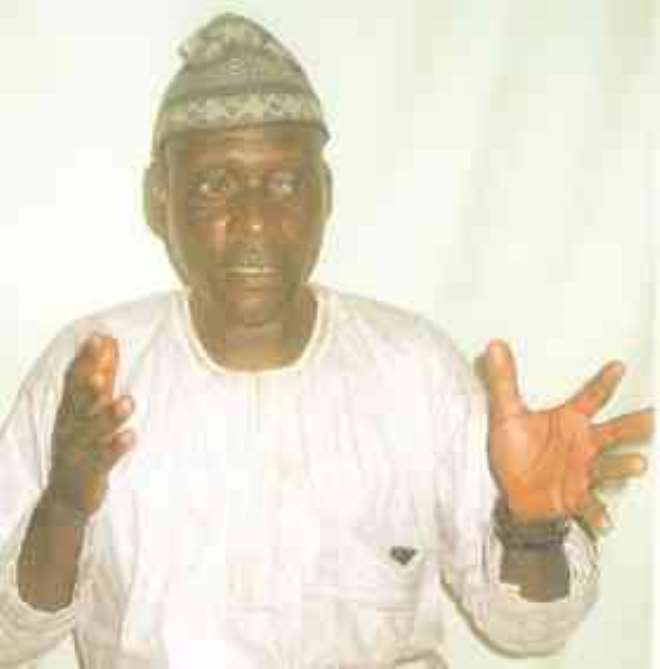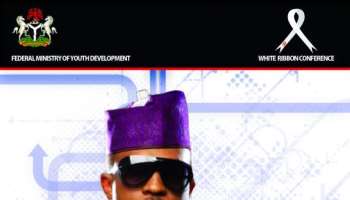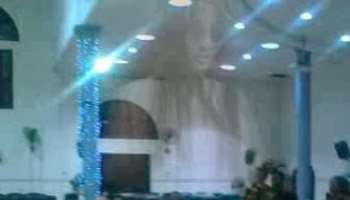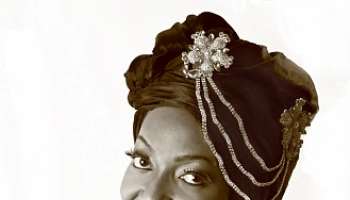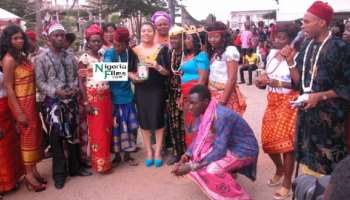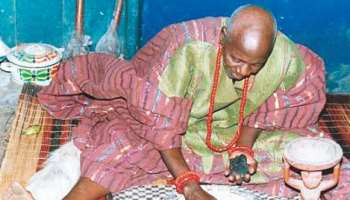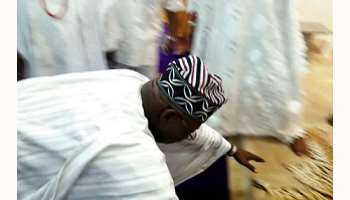Return of the Black Art: Witches, wizards go public, hold retreat
WONDERS shall never end, even as Christians say that the termination of the world is near, very near indeed.
Last week, the media was agog with reports that an “association” of witches and wizards held a press conference!
And its supposed members told some politicians of the misfortune awaiting them in the on-going political contests in the country. Not that the warnings were bad in themselves, but many a Nigerian were baffled at the source they were emanating from.
“Drop your presidential ambition, witches, wizards warn Atiku”, a headline of a newspaper had flashed of the witches' warning in one of the reports.
The report continued: “The contest for the nation's coveted seat, particularly the emergence of the presidential candidate of the Peoples Democratic Party (PDP) has gone from the terrestial to the celestial realm.
“The outcome, if the warning of the Witches and Wizards Association of Nigeria (WITZAN) is anything to go by, might have been predetermined on the spiritual plane.
“In a statement signed by the National Coordinator of the association, Dr Okhue Iboi, WITZAN told former Vice-President, Alhaji Atiku Abubakar, to withdraw from the battle to clinch the presidential ticket of the PDP or face humiliation that will spell doom for his political career.
“Giving this warning in Lagos, Iboi said the collective body of witches and wizards had resolved that Atiku should quit the race or risk being disgraced out of politics.
“While saying that the warning to Atiku was based on revelations given to the witches and wizards in Nigeria at the end of a three-day retreat they held in Ofosu in Edo State, he said, “we are not politicians. Witches and wizards are a group of patriotic Nigerian citizens who wanted the best for this nation. During our three-day retreat in Ofosu, it was revealed to us that Atiku's days of relevance in Nigeria politics are numbered.
“It was revealed to us in our crystal ball that Atiku was going nowhere.........”
Responding to the report, a reader had shouted “wonder shall never cease, Nigeria is a country of anything goes.” The reader would later argue that the principle of freedom of expression and association as enshrined in the Nigerian Constitution is being assaulted. “What a shameless publicity,” the reader further blurted. Apart from this reader, many others that read the report reacted in awe.
Why the shocked responses? It may be queried. It's common knowledge that as powerful and terrific as many people regard those who practise witchcraft to be, they never dared, in the past, come to the open and do a pride of that power because of the evil meaning people attached to it. Besides, the two major religions of the world- Christianity and Islam- strongly condemn it and those who practise it. Also, the laws of virtually all the countries of the world are against it.
Witchcraft, in various societies, is the alleged use of supernatural or magical powers. Historically, it was widely believed that witchcraft involved the use of these powers to inflict harm upon members of a community or their property. Since the mid 20th century, the term witchcraft has sometimes been used to distinguish between bad witchcraft and good witchcraft, with the latter often involving healing. The concept of witchcraft as harmful is normally treated as a cultural belief and a means of explaining human misfortune by blaming it either on a supernatural entity or a known person in the community
Beliefs in witchcraft, and resulting witch-hunts, are both found in many cultures worldwide, today mostly in Sub-Saharan Africa, and historically notably in early modern Europe of the 14th to 18th century, where witchcraft came to be seen as a large diabolical conspiracy against Christianity, and accusations of witchcraft led to large-scale witch-hunts, especially in Germanic Europe. It has also come to be regarded by some people as a suppressed pagan religion and was popular in the 19th and 20th centuries.
Probably, according to historians, the most obvious characteristic of a witch was the ability to cast a spell, a “spell” being the word used to signify the means employed to carry out a magical action. A spell could consist of a set of words, a formula or verse, or a ritual action, or any combination of these. Spells traditionally were cast by many methods, such as by the inscription of runes or sigils on an object to give it magical powers; by the immolation or binding of a wax or clay image (poppet) of a person to affect him or her magically; by the recitation of incantations; by the performance of physical rituals; by the employment of magical herbs as amulets or potions; by gazing at mirrors, swords or other specula (scrying) for purposes of divination; and by many other means.
However, there are several references to witchcraft in the Bible that strongly condemn such practices. For example, Deuteronomy 18:11-12 condemns anyone who “..casts spells, or who is a medium or spiritist or who consults the dead. Anyone who does these things is detestable to the Lord, and because of these detestable practices the Lord your God will drive out those nations before you” (NIV). Exodus 22:18 states “Thou shalt not suffer a witch to live,” while Leviticus 20:27 says “A man also or woman that hath a familiar spirit, or that is a wizard, shall surely be put to death: they shall stone them with stones: their blood shall be upon them” (KJV). In the Holy Scripture, the strong condemnations of such practices do not seem to be based so much upon the supposition of fraud as upon the abomination of the magic in itself.
The word “witch” in Exodus is a translation of the Hebrew word “kashaph,” which comes from the root meaning “to whisper.” The word as used in Exodus probably thus meant “one who whispers a spell.” In context, the Exodus passage probably was intended to urge Jews to adhere to their own religious practices and not those of surrounding tribes.
In 420 BC Saint Augustine of Hippo, an influential theologian in the early Christian Church, argued in the early 400s that God alone could suspend the normal laws of the universe. In his view, neither Satan nor witches had supernatural powers or were capable of effectively invoking magic of any sort. It was the “error of the pagans” to believe in “some other divine power than the one God.” Of course, if witches are indeed powerless, the Church need not overly concern itself with their spells or other attempts at mischief.
The late medieval Church accepted St. Augustine's view, and hence felt little need to bother itself with tracking down witches or investigating allegations of witchcraft.
In 1208, Pope Innocent III opened an attack on Cathar heretics who believed in a world in which God and Satan, both having supernatural powers, were at war. The Church attempted to discredit the Cathar belief by spreading stories that the heretics actually worshiped their evil deity in person. Propagandists for the Church depicted Cathars kissing the anus of Satan in a ceremonial show of loyalty to him. As a result of the Church's sustained attacks, the public's understanding of Satan moved from that of a mischievous spoiler to a deeply sinister force.
In spite of condemnation by major religions, modern practices identified by their practitioners as “witchcraft” have arisen in the twentieth century, generally portrayed as revivals of pre-Christian European magic and spirituality. They thus fall within the broad category of Neopaganism (new paganism). The first groups of neopagan witchcraft to publicly appear in the 1950s and 1960s were Gerald Gardner's Wicca and Roy Bowers' Clan of Tubal Cain. They operated as initiatory secret societies. More recently a movement to recreate pre-Christian traditions has taken shape, including such practices as Divination, Seid and various forms of Shamanism.
Here in Nigeria, attempt at presenting witchcraft as not evil has led to dreaded societies of some of the practioners of the art renaming themselves to reflect the mood and spirit of the present time. That's why the Ogboni Confraternity in the South-West has now changed to the Reformed Ogboni Confraternity. And unlike before, the confraternity can now be identified by known addresses and members can meet to public knowledge.
Some people believe that not everything about witchcraft is evil and that it can in many situations benefit mankind. Supporting this view, Madeleine Bunting of the The Guardian, London wrote: “The danger is that the aggression and hostility to magic/witchcraft in all its forms.. deters engagement with the really interesting questions that have emerged recently in the science/[necromancy] debate. The durability and near universality of [witchcraft] is one of the most enduring conundrums of evolutionary thinking... Does spell-casting still have an important role in human wellbeing? ... If sorcery declines, what gaps does it leave in the functioning of individuals and social groups?”
Other religions on witchcraft
Judaism: Jewish law views the practice of witchcraft as being laden with idolatry and/or necromancy; both being serious theological and practical offenses in Judaism. Although Maimonides vigorously denied the efficacy of all methods of witchcraft, and claimed that the Biblical prohibitions regarding it were precisely to wean the Israelites from practices related to idolatry, according to Traditional Judaism, it is acknowledged that while magic exists, it is forbidden to practice it on the basis that it usually involves the worship of other gods. However, some of the Rabbis practiced “magic” themselves. For instance, Rabbah created a person and sent him to Rabbi Zera, and Rabbi Hanina and Rabbi Oshaia studied every Sabbath evening together and created a small calf to eat (Sanhedrin 65b). In these cases, the “magic” was seen more as divine miracles (i.e., coming from God rather than pagan gods) than as witchcraft.
Judaism does make it clear that Jews shall not try to learn about the ways of witches (Deuteronomy/Devarim 18: 9–10) and that witches are to be put to death. (Exodus/Shemot 22:17). Judaism's most famous reference to a medium is undoubtedly the Witch of Endor whom Saul consults, as recounted in the First Book of Samuel, chapter 28.
Islam: Divination and magic in Islam include a wide range of practices, including black magic, warding off the evil eye, the production of amulets and other magical equipment, conjuring, casting lots, astrology, and physiognomy. Muslims do commonly believe in magic (Sihr) and explicitly forbid its practice. Sihr translates from Arabic as sorcery or black magic. The best known reference to magic in Islam is the Surah Al-Falaq (meaning dawn or daybreak), which is known as a prayer to Allah to ward off black magic says: I seek refuge with the Lord of the Dawn From the mischief of created things; From the mischief of Darkness as it overspreads; From the mischief of those who practise secret arts; And from the mischief of the envious one as he practises envy. (Quran 113:1–5).
There's much ignorance about witchcraft –Prof. Sophie Oluwole
As a philosopher, I am only engaged in the task of getting at the bare facts of statements. I am not a scientist. The main thrust of my study is to find out whether people do have reason for certain expressions and utterances appertaining to witchcraft. Now to the question of wether witchcraft exists: Is there proof that there are witches or not? The answer is no proof per se. But it is possible. Somewhere in the grey cloud between the dark of night and the brightness of dawn, a lot is possible.
Now, there is much ignorance going on around, about what Christianity or traditional religion is all about. I once went to one big church in Lagos, to present a paper. I don't want to mention the name now. When I came out, somebody asked me, “Are you a Christian? And I replied that it is a personal problem.
If a Christian believed that there is witchcraft, how does that become a conflict? Didn't the Bible, the Christians' holy book, talk about witchcraft? Do pastors not teach about witchcraft and wizards? Do you know how many churches derive their popularity and acceptance on the premise of deliverance and salvation from the clutches of witchcraft and spiritual bondage? Is it any secret that many of the churches, especially the Pentecostal churches premised their pastoral work on deliverance from the clutches of witchcraft and wizardry? Please, let someone answer these questions before they take me to the gallows for my works. As far as I am concerned, I have nothing to do with witches or witchcraft. I studied it as an academic. I don't preach it, I don't practise it but I want to find out the fact about it. It is those who lay claim to have the power to neutralise the effect of witchcraft, notable Christians in many instance, that are actually connoting by their utterances and claims that witchcraft exist and its effect effective, not me, a mere scholar who is just trying to get to the fact behind the phenomenon of witchcraft.
How do you feel when somebody is exhibiting ignorance or foolish tendencies? How do you feel when you know that somebody is talking about what he knows next to nothing? I was at the naming ceremony of my niece and the pastor was preaching and said that he lives next to a street, which name is 'Esugbami'(Devil saves me) and he said that the people who bear that name must be crazy because how can Esu (Devil) save anyone. Esu is Satan, devil, he is this and that, the accursed one according to Biblical narration. I just walked out because the man does not know the meaning of Esu or devil. Devil is the minister of justice, an incorruptible judge and if in your society, the name Esu means a honest person, who will not punish a person who is not an offender, is it a sin to name your child or yourself after such judge?
Latest News
-
 "If You're For Me, I Am For You" - Cubana Chief P
"If You're For Me, I Am For You" - Cubana Chief P -
 "3 Days To Go" - Femi Adebayo Urges Fans To Get S
"3 Days To Go" - Femi Adebayo Urges Fans To Get S -
 "Stop Asking Me Questions About Speed Darlington"
"Stop Asking Me Questions About Speed Darlington" -
 "Benue Is The Most Underdeveloped State I've Ever
"Benue Is The Most Underdeveloped State I've Ever -
 Stan Alieke Urges Young Professionals To Take Lin
Stan Alieke Urges Young Professionals To Take Lin -
 Chizzy Alichi Teases Fans With Baby Reveal, Promot
Chizzy Alichi Teases Fans With Baby Reveal, Promot -
 "I'm Not Wearing Makeup From July 4th Till Decemb
"I'm Not Wearing Makeup From July 4th Till Decemb -
 "Stop The Challenge Of Mocking Kids With Down Syn
"Stop The Challenge Of Mocking Kids With Down Syn -
 Regina Daniels Celebrates Sons As They Mark Birthd
Regina Daniels Celebrates Sons As They Mark Birthd -
 Speed Darlington Threatens To Sue NAPTIP For Defam
Speed Darlington Threatens To Sue NAPTIP For Defam


